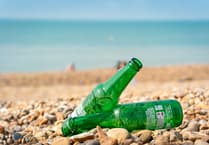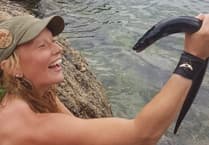Scientists have provided an update on the death of a ‘well-known’ dolphin named Vader after his rare live stranding on Ynyslas beach.
The elderly and thin three-metre marine mammal washed up alive and caught the attention of passers-by last Saturday (6 May) who tried to push him back out to sea.
The Cetacean Strandings Investigation Programme conducted a necropsy four days later and found he was not seriously malnourished but was suffering from an infection in his jaw – along with age-related conditions such as loss of teeth.
Dr Sarah Perry of the Cardigan Bay Marine Wildlife Centre told the Cambrian News last week that the post-mortem analysis will allow scientists in the area to add to their understanding about the health of bottlenose dolphin populations.
She said Vader had frequented the shores of Ceredigion for more than 30 years and she has known him since the start of her career. The centre’s scientists said they will 'miss him'.
Vader, also known as Graeme, was mostly seen frolicking near New Quay and was easily identified because of the distinctive notch at the base of his dorsal fin. Bottlenose dolphins can live for up to 60 years.
The investigation programme said: “The 323cm adult male bottlenose dolphin was judged to be in moderate nutritional condition.
“The dolphin had been feeding actively around the time of death, with semi digested fish, bones, crab shells, shark eggs and other items in the stomach.
“A large quantity of sand was also present in the lumen of the first stomach (consistent with live stranding) - no marine debris/plastics were found.
“The dolphin had a number of age-related changes including arthritic wear on the pectoral fin joints and loss of many teeth, with significant wear on the small number of remaining teeth.
“The CSIP team also found evidence of infection within the lower jaw that may have caused some deformity and the adrenal glands were polycystic in nature - the relative significance of these lesions is still being assessed.
“Information from colleagues at the Sea Watch Foundation and Cardigan Bay Marine Wildlife Centre (CBMWC) indicated that this was a member of the resident Cardigan Bay bottlenose dolphin population.
“Nicknamed 'Graeme' and 'Vader' he had first been sighted over 30 years ago in 1990.
“A wide variety of samples have been collected and follow up tests are pending, which may shed further light on the cause of this animals live stranding and death.”
It is thought bottlenose dolphins are native to Cardigan Bay and remain here most of their lives – though there is uncertainty about where they go in the winter, as they can head further north nearer Liverpool Bay. But there are sightings of them in Ceredigion throughout the year.
There are populations of dolphins in Scotland and Ireland but as far as the Cardigan Bay Marine Wildlife Centre is aware they do not mix.
The centre - which is an offshoot of the Wildlife Trust of South and West Wales - carries out research on their health and the way they communicate.
Dr Perry last week said: “We use dolphin dorsal fins to identify individual animals and have been doing photo ID of fins in Cardigan Bay for over 20 years now, which is part of our research.
“It gives us a little more information about areas they’re using, who they’re hanging out with, and which areas are important to them.
“We had the animal in our photo ID catalogue, so Vader was quite well known to us.
“It is very rare we get strandings and when we do it is very useful to gather information about the populations along Cardigan Bay.
“It’s highly likely this animal wasn’t very well and was struggling because it was quite thin, and its teeth were well worn but we don’t have the facts yet.
“However, it is also an opportunity for us to find out more. Maybe we can see remnants of what it has been eating in its stomach.
“So, there is a lot you can gather from these not so nice events.”
Matthew Westfield, Marine Environmental Monitoring's strandings co-ordinator, said: "Once on scene we were able to assess the animal and confirm that it was an adult male bottlenose dolphin.
“Bottlenose dolphins are a key species in our waters around the Welsh coast with a number of pods being seen around the coastline. It is very unusual for them to live strand.
"They are a very intelligent animal and normally only strand when unwell. By sharing the pictures we took of the dorsal fin with the Cardigan Bay Marine Wildlife Centre (CBMWC) and Sea Watch Foundation who both keep records of the dolphins around our coast we was able to find out a lot about this particular dolphin.”





Comments
This article has no comments yet. Be the first to leave a comment.